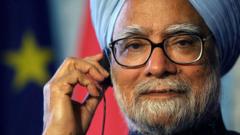In a surprising turn of events, McDonald's Japan has decided to postpone its upcoming promotion featuring toys based on the beloved pirate-themed manga "One Piece". This decision comes in response to substantial backlash from consumers after a recent giveaway of Pokémon cards with their "Happy Set" meals, which led to disturbing incidents of food wastage.
The promotion was set to launch on August 29 but was put on hold as McDonald's announced a review of their "Happy Set-related initiatives". Earlier this month, the Pokémon card promotion created chaotic scenes, with long lines of customers and instances of bulk buying. On social media, pictures circulated showing piles of uneaten food discarded on the streets, igniting concerns over unsustainable practices.
Moreover, reports surfaced that some individuals were selling the Pokémon cards online for significant profits, with one card featuring the iconic character Pikachu currently listed for an astounding £25,000 (approximately $33,000) on auction sites. Due to overwhelming demand, many locations quickly ran out of cards within the first day of the promotion, highlighting the level of obsession that surrounds these collectibles.
In light of the Pokémon debacle, Japan's Consumer Affairs Agency has urged McDonald's to reassess its sales strategies and take proactive measures to address food waste. In subsequent statements, the company expressed its commitment to rectify the situation by reverting to toys from previous Happy Set meals until further notice.
This isn't the first time McDonald's has faced challenges with themed promotions. A partnership with the "Chiikawa" manga series earlier this year similarly drew ire, leading to customer frustration and online resale issues. Following consumer complaints and a public apology, McDonald's stated they would review their promotional tactics to prevent future mishaps and introduce a limit on how many Happy Set meals could be purchased at once.
With the immense popularity of Pokémon and One Piece in Japan, it remains to be seen how McDonald's will navigate these challenges while maintaining customer engagement in their promotional efforts. The saga underscores the delicate balance between marketing strategies and social responsibilities.
The promotion was set to launch on August 29 but was put on hold as McDonald's announced a review of their "Happy Set-related initiatives". Earlier this month, the Pokémon card promotion created chaotic scenes, with long lines of customers and instances of bulk buying. On social media, pictures circulated showing piles of uneaten food discarded on the streets, igniting concerns over unsustainable practices.
Moreover, reports surfaced that some individuals were selling the Pokémon cards online for significant profits, with one card featuring the iconic character Pikachu currently listed for an astounding £25,000 (approximately $33,000) on auction sites. Due to overwhelming demand, many locations quickly ran out of cards within the first day of the promotion, highlighting the level of obsession that surrounds these collectibles.
In light of the Pokémon debacle, Japan's Consumer Affairs Agency has urged McDonald's to reassess its sales strategies and take proactive measures to address food waste. In subsequent statements, the company expressed its commitment to rectify the situation by reverting to toys from previous Happy Set meals until further notice.
This isn't the first time McDonald's has faced challenges with themed promotions. A partnership with the "Chiikawa" manga series earlier this year similarly drew ire, leading to customer frustration and online resale issues. Following consumer complaints and a public apology, McDonald's stated they would review their promotional tactics to prevent future mishaps and introduce a limit on how many Happy Set meals could be purchased at once.
With the immense popularity of Pokémon and One Piece in Japan, it remains to be seen how McDonald's will navigate these challenges while maintaining customer engagement in their promotional efforts. The saga underscores the delicate balance between marketing strategies and social responsibilities.












